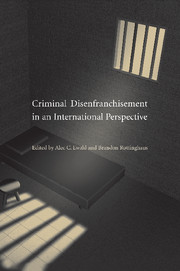Book contents
- Frontmatter
- Contents
- Contributors
- Foreword: Waves of Democracy and Criminal Disenfranchisement
- Acknowledgments
- Introduction
- Part I CONTEMPORARY DISENFRANCHISEMENT LAW
- Part II DISENFRANCHISEMENT IN COMPARATIVE PERSPECTIVE: LEGAL AND POLITICAL APPROACHES
- Part III VOTING RIGHTS AND PEOPLE WITH CRIMINAL CONVICTIONS: CASE STUDIES
- 6 The Politics and Legality of Prisoner Disenfranchisement in Australian Federal Elections
- 7 The Campaign for Prisoner Voting Rights in Ireland
- 8 The Ballot as a Bulwark: Prisoners' Right to Vote in South Africa
- 9 The Right to Vote in Danish Prisons
- 10 In Defense of Prisoner Disenfranchisement
- Index
- References
6 - The Politics and Legality of Prisoner Disenfranchisement in Australian Federal Elections
Published online by Cambridge University Press: 03 July 2009
- Frontmatter
- Contents
- Contributors
- Foreword: Waves of Democracy and Criminal Disenfranchisement
- Acknowledgments
- Introduction
- Part I CONTEMPORARY DISENFRANCHISEMENT LAW
- Part II DISENFRANCHISEMENT IN COMPARATIVE PERSPECTIVE: LEGAL AND POLITICAL APPROACHES
- Part III VOTING RIGHTS AND PEOPLE WITH CRIMINAL CONVICTIONS: CASE STUDIES
- 6 The Politics and Legality of Prisoner Disenfranchisement in Australian Federal Elections
- 7 The Campaign for Prisoner Voting Rights in Ireland
- 8 The Ballot as a Bulwark: Prisoners' Right to Vote in South Africa
- 9 The Right to Vote in Danish Prisons
- 10 In Defense of Prisoner Disenfranchisement
- Index
- References
Summary
To remove the right of prisoners to vote does many things. … It signals that whatever the prisoner says is not of interest to those at the top, that you are not interested in talking to them or even listening to them, that you want to exclude them and that you have no interest in knowing about them.
INTRODUCTION
In June 2006, Australia passed legislation disenfranchising all prisoners serving full-time custodial sentences from voting in federal elections. This followed a succession of changes dating from 1983 that alternately extended and restricted the prisoner franchise. In 1989 and 1995, the Australian Labor Party (ALP) federal government prepared draft legislation removing any restrictions on prisoner voting rights in federal elections; the measures were defeated and withdrawn. With the 2006 legislation, the Howard Coalition government (composed of the Liberal and National parties) successfully achieved the total disenfranchisement it first sought in 1998.
This chapter examines the politics and legality of the 2006 disenfranchisement. This will be approached, first, by briefly outlining the key provisions of the Commonwealth Electoral Act 1918, offering a short legislative history of prisoner franchise, and examining some of the key constitutional issues. Second, the 2006 disenfranchisement introduced in the Electoral and Referendum (Electoral Integrity and Other Measures) Act 2006 will be examined in greater detail, particularly in terms of the manner in which it was achieved and the arguments that were mobilized both in support of and against the change.
- Type
- Chapter
- Information
- Criminal Disenfranchisement in an International Perspective , pp. 167 - 204Publisher: Cambridge University PressPrint publication year: 2009
References
- 1
- Cited by



